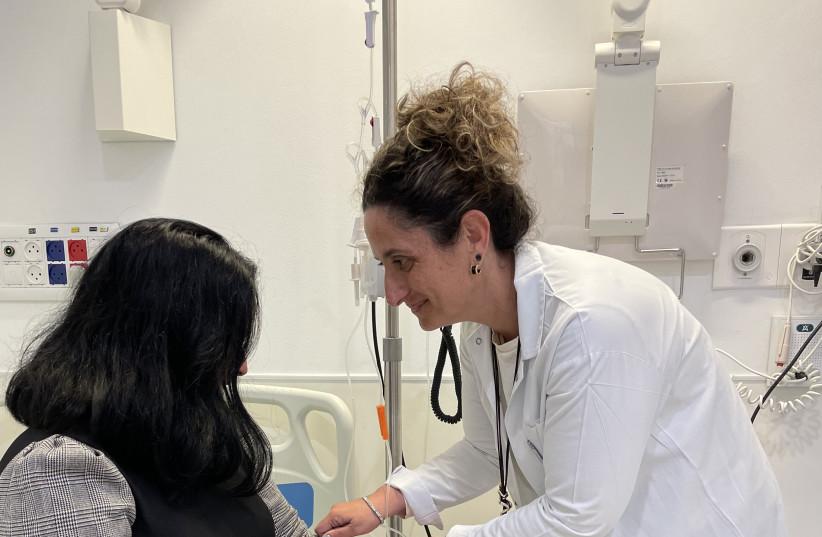by Hilary Haverman
Dr. Larisa Ryvo now works with Olaparib to prevent breast cancer from occurring or recurring.
 |
Dr. Ryvo checks her patient at Assuta Ashdod Hospital
(photo credit: Rena Young)
|
Jewish women of Ashkenazi origin have a 1-in-40 chance of developing a gene mutation that causes breast cancer.
The mutation, which occurs on the BRCA1 or BRCA2 gene, increases the breast cancer risk for young women and raises the risk as they age. The chance of getting breast cancer from these gene mutations is significantly higher for Ashkenazi women than the general population.
In Israel, where Ashkenazi Jews comprise about 30% of the population, a risk for breast cancer poses significant concern.
Dr. Larisa Ryvo, director of the Institute of Oncology at Samson Assuta Ashdod University Hospital, is currently working with a treatment protocol that could prevent breast cancer from occurring altogether as well as preventing recurrence in patients who have survived an initial bout.
The drug is called Olaparib, and it acts effectively against cancers in people with hereditary BRCA1/2 mutations.
In a 2017 study, researchers found that Olaparib “provided a significant benefit over standard therapy; median progression-free survival was 2.8 months longer; and the risk of disease progression or death was 42% lower with Olaparib monotherapy than with standard therapy.”
Olaparib studies found that the drug stopped the development of cancer in women at the metastatic stage of breast cancer, Ryvo explained. It has also been used with women after they have had breast cancer-related surgery.
Researchers found that after a year’s usage the drug was effective in preventing recurrence. The drug has been approved for use in Europe and the US and is available in Israel through the national HMO plans.
Prevent and check
In Israel, with such a large population at risk for breast cancer, testing is of paramount importance. Although Israel has some of the best labs in the world, the challenge has been to ensure that people take the test, Ryvo said.
“We have a few populations that just don’t want to be tested,” she said. “We have two ends of the spectrum. Arabs don’t want to get checked, although we aren’t sure how much they need to be checked. Then there are religious Jewish families, where we know they need to be checked but it’s hard to convince them to come for a test.”
Dr. Ryvo, who was born in Russia, has been involved in cancer research for many years. She worked previously at Sourasky Medical Center in Tel Aviv, but wanted to come to a smaller city, Ashdod, to serve people in Israel’s periphery.
“I know the general service patients receive in the periphery isn’t as good as it is in the center of the country,” she said. “It didn’t make sense to me that patients weren’t getting as much care as in Tel Aviv. But we see at Assuta Ashdod they’re now getting far better care closer to home.”
In addition, she said, Assuta Ashdod staff is raising local awareness about breast cancer prevention.
Ryvo advises women to take action: schedule a mammogram, be aware of early detection, and go to a doctor when something doesn’t feel right.
“If you see something, feel something, go get checked immediately,” she said. “There’s no reason to wait. Listen to your body.”
This article is written in cooperation with Samson Assuta Ashdod University Hospital. To make a year-end contribution, click here.
Hilary Haverman manages content for the hospital.
Source: https://www.jpost.com/health-and-wellness/article-725468?vgo_ee=VoZfffj8MPT%2BIEw2Kx4Ihr35hO7C%2FF3J%2FgQB9Uu3XAY%3D
No comments:
Post a Comment